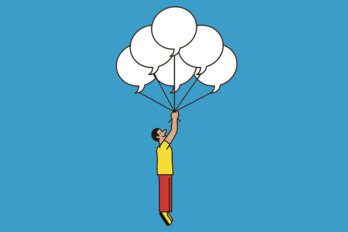This article contains discussion of suicide. If you or someone you know is having a suicide crisis, please call the Canada Suicide Prevention Service (1-833-456-4566), which offers 24/7 support. There is also Kids Help Phone (1-800-668-6868), the First Nations and Inuit Hope for Wellness Help Line (1-855-242-3310), and 1-866-APPELLE (for Quebec residents).
Many of my best childhood memories involve movies.
Adventuring with Puff the Magic Dragon, the videotape that came with our brand new Betamax player. Renting Flash Gordon from Kwan’s Video Superstore again and again. Trembling under a blanket through Halloween II, the first movie to beam into our farm via the SETI Institute–size satellite dish newly planted in our backyard. Making a wish that Mom didn’t need me to share because she already knew I wanted her to stop by Kwan’s after work and rent the spy adventure Cloak & Dagger, again. My sister and I warping our minds on a not-very-well-hidden copy of the sexy sci-fi epic Barbarella. Making my own movies: writing outlines, synopses, treatments, and scripts, then roping obliging siblings, parents, friends, and pets into acting as the stars of my genre knockoffs and weirdo film poems.
I still remember the first time. I was five. I had stolen an anthropomorphic wolf toy from kindergarten and lied about it. Caught, lectured, and sent up to my room, I bawled in bed, punching my pillow and shaking in a blaze of sadness, anger, and shame. My own Wolfman-like transformation came in two phases. First, this new question, repeated through my snotty, snivelling sobs: “Why was I born?” Then, struggling to answer this impossible query, a new understanding opened up in me. I could be the opposite of born, and I could be the one who did it—the one who made me not be.
In the years since, cinema and my sickness have remained my constant companions. I had no idea, or, at least, I was not able to face, how intimately the two were bound. This changed when I started attending the Toronto International Film Festival (TIFF).
Officially, I have attended TIFF since 2015 for work. As part of my creative, scholarly, and teaching development, I branched out from poetry, undertook an intensive filmmaking certificate, and began writing and making short films (which are as niche and obscure as my poetry, so the shift is not as big as it might sound). With more than 300 movies screening over ten days, TIFF provided the ideal opportunity to learn what was happening in the film world and connect with filmmakers, expanding my creative practice and introducing me to potential flicks to teach and guests to bring to campus.
My worst childhood memories involve this thought: Kill yourself.
Not so officially, I sacrifice every second I can to TIFF, conducted by a deeper urge, an impulse that arises from this relationship between movies and my struggle with debilitating depression and obsessive suicidal thoughts—a sense that maybe all these movies help keep me alive.
Sometimes, a big screen sinks between me and the world. It’s a disfiguring filter that only lets the bad things in, warping every perception into a personal failing or injurious attack. It’s a windshield streaked by a storm of rain, mud, and fire—the car stalled, the downpour mounting.
When the depression is deep, even the most rudimentary and essential tasks—rising and washing, speaking and breathing, not crying and not collapsing—are nearly impossible. It feels like I’m shuffling through the world in a tunnel. Eventually, I plummet into a deeper pit, a tear-addled hibernation barely distinguishable from suicide by stagnation.
TIFF, I see now, concentrates one of my techniques for surviving depression. Oscillating between exhausted stasis and sobbing convulsions drove me to quit jobs, ignore friends, and hide from family as I shuttered myself in my apartment. This sickness also made reading and writing impossible, impairing my focus, memory, energy, and imagination to the point where I could not consume or compose a single sentence. The one thing I could handle—and that helped—were movies.
Whether I cried, quarter-listened, or nodded off, the movies played, impressing on me at least a minimal experience of the sensory and symbolic world. Movies gifted me human contact, however mediated or simulated, without ever offering rolled eyes and a scoffed, “Cheer up!” Countering my single-hearted howling, the characters in movies dreamt and felt and strived with variety and power. Opposing my emptiness, movies bore the rich plenitude of the world—all the eras, regions, and peoples invented and animated by all these eras, regions and peoples, distilling meaning and multiplying life.
This abundance lifts me at TIFF—the variety and power of the drama, destruction, hilarity, union, and mystery, all the portals opened to different worlds every two hours on the Scotiabank Theatre’s twelve screens. Even now, these movies resonate in me, linking me to their ghosts and presents and possibilities: the sublime, body-shaking stomps of the folk dancers in Cold War–era Poland, pulled from their rural lives to fuel a propagandic push; the stolen car streaking down an Ontario highway as two best friends make their surprising and invigorating escape from the small-town, small-minded men who aimed to cage them; the father chasing a bus, waving and shouting goodbye for the last time to the boy who is not his son but really, in this moment, is; the reveal that the outcasts are, in fact, magical, and them making love in such a surprising, glorious way that, even though we’re only mid-flick, the whole theatre erupts in spontaneous applause.
I know movies are usually viewed as an escape from reality, but the opposite of this adage has always felt true to me. Movies are an immersion in existing realities and real fantasies we otherwise would never have had access to—crossing all sorts of temporal, spatial, and bodily borders. They plunge us into the lives and longings vivified on the screen and connect us to the lives and labours of their makers. So if movies are, in fact, an escape, they are the best kind of flight: a break from my single, limited, distorted point of view.
Sometimes, a big screen stretches between me and the world. It’s an all-encompassing cinema that plays one relentless feature: a cruel, dominating chorus of voices seething with hate, whispering and shouting, cackling the vilest insults in harmony with other voices urging me to end it. Images flash up beyond my control, old familiars like the skin-ripping, bone-busting force of a shotgun shell fired through my temple. Or location-specific visions of a leap in front of that speeding subway train, or driving that kitchen knife deep into my chest. They loop like GIFs in browser windows that cannot be closed on a screen that looms before all my views, eyes open or shut—repeating and repeating and repeating as I fight to read, converse, write, teach.
One of my first, most common, and most ill-conceived counterattacks has been the frantic consumption of any sense-altering substance: the forced glee of twenty-six ounces of tequila, the distracting hallucinations of five grams of mushrooms, or even the chalky, slo-mo, full-body drawl of a dozen Gravol—anything to silence the voices, stall the visions, numb the body, and fabricate an escape. The end result would make a spectacular special effect: the kick that scatters a bonfire but sets the whole forest ablaze.
Movies have served as a (relatively) healthy indulgence, a sort of stabilized bender or controlled trip. Instead of chugging a cheap six-pack or dropping a tab of acid, I would hit Video Vision in Moose Jaw and rent a half-dozen tapes, or spend a day in Regina catching three movies at three different theatres. At home now in Toronto, I binge stream or marathon movies PVR’d from TCM, TMN, Action, and AMC. These epic viewing sessions offer many of the same benefits as the excessive consumption of intoxicating substances—from the adventure of transformed perception to the comfort of the repetitious act—without the extreme drawback of damaging my brain chemistry or internal organs.
Movie by movie, TIFF is a vehicle for this experience. This perception-altering high is especially evident when the movies start to bleed together, which begins around the fifteenth screening and peaks around number forty. The same actor appears in different films, and my mind interweaves the roles. L.A.’s nighttime streets swerve into Cairo’s and then wind into Istanbul’s just around the bend. I mistake the haunting, stunning forest in the story of a famous musician retiring to her reserve for a return of the tangled, haunted jungle in the Thai film about a local fisherman’s friendship with a Rohingya refugee .
My initial impulse is to straighten up, reaffirm the divisions between films, but eventually I accept this breach, following the interconnections where they lead me, enacting, in a way, the proverb that opens the Tibetan noir road movie: “If I tell you my dream, you might forget it. If I act on my dream, perhaps you will remember it; but if I involve you, it becomes your dream, too.” Why not explore what happens when one movie’s dream seeps into another movie’s dream? Why not see what can be perceived, witnessed, interpreted, and felt by allowing the festival’s dream state to take hold?
One of the most enlivening side effects of these movie marathons is that I get so involved in the dream vision of movies that it becomes a lens that transforms the everyday world. This effect is strongest when I walk home at night after a day of screenings. The mundane streets I have travelled hundreds of times bloom with entities that appear bigger than life and resonate with symbolic fervour—a wind-rippled willow, a streak of fluorescent graffiti, a gutter-bound pair of long johns. My eye frames fertile shots, whether isolating the empty park bench in its welcoming beauty or defamiliarizing a condo’s balconies so they loom like tombstones.
This state can get somewhat disruptive when its lens extends into the next day, especially if I am at work. These mini-flashbacks are more stimulating and amusing than dangerous, however, ranging from the interpretive query—What does it mean that my colleague’s face is presented in half-shadow?—to more technical questions—Why is the student visiting during office hours lit so poorly? Why are the sound levels off, the noise from the hall drowning out her voice?
Sometimes, a big screen looms between me and the world. It’s a billboard advertising all my failures and regrets, stretching down the highway as far as I can see. This billboard stains the landscape of every turnoff and backroad. No matter which path I travel, the message is the same: “You are too weak to live the life you dreamt!”
To make movies—that was the life I dreamt of when I was a kid. This dream fully took hold in grade eight, when the amazing Mrs. McIntyre taught a film class, which inspired my parents to give me a Canon camcorder for graduation. After that, I made movies for every school project I could, from the animated Lego tour of the ancient world for grade nine History to End of Jest, the terrible Tarantino rip-off (picture Reservoir Dogs, but with clowns!) I directed in grade twelve for the Fall One Act Festival. I also made movies with family and friends. My two favourites were Asylum Blues, the (for lack of a better descriptor) absurdist gothic horror poem starring my so-cute-he-was-creepy little brother, and Billy Bobcat and Andy Apocalypse Meet the Turkey King, which featured a riding lawnmower chase and real live turkeys (one of the perks of making movies on a farm).
I attended the University of Regina with the intention of studying film production. I did not arrive at university driven by visions of Oscars or summer blockbusters. I wanted to make B- (or, really, F-) grade horror movies for Full Moon Entertainment, the creators of some of my all-time favourites: Puppetmaster, Demonic Toys, and Dollman.
Instead, my sickness hit. I could barely drag myself to the registrar’s office to submit my film-major application form. I needed a signature from the film department, only a few buildings away on our small campus. I found a chair, trying to build up the will to complete this simple task. I failed, remaining trapped in that chair before shuffling back to my dorm room’s dark. Two years later, having backed into an English major, I failed more, getting kicked out of school and put on academic probation. A year later, freaking out in my Moose Jaw apartment, I failed further, smashing every tape with every movie I had ever made and tossing the debris into a garbage can in the alley.
One of the benefits of TIFF is that it plunges me into the community my younger self dreamt of. I attend the festival through the scholar’s version of the Press and Industry Pass, so my fellow moviegoers represent every facet of the biz: from film journalists to producers to directors to theatre owners to organizers of other festivals.
The eavesdropping fly on the wall is privy to the full spectrum of the festival’s behind-the-scenes intrigue, from the comedic—producers riffing hilariously on all the ways their friend (not present) would cut corners making a major Hollywood picture—to the agonizing—a distributor bragging about how great it feels toying with directors because they all need to be brought down a peg. One-on-one chats, in line or seated pre-screening, illuminate all aspects of the industry and offer an energizing opportunity to nerd out with fellow film fans about what we’ve loved and loathed and can’t wait to see. There are funny little intimate moments of connection, too. Raising a coffee cup in cheers to the only other attendee at the early morning screening of a movie with no buzz. Or, in the packed lobby, catching a festival-frazzled woman struggling with what she believes to be a water dispenser; before I can stop her, she streams fake butter into her bottle and we share a laugh in solidarity and exhaustion.
Profession-wise, one of the biggest benefits of TIFF is the rewarding feeling of both not belonging and belonging completely. No way, no how, could I have survived, let alone thrived, in the movie business. I would have been quickly jettisoned from the world of pitching and schmoozing, of markets, mega-budgets, and mega-budget marketing. At the same time, I am inspired to meet, on screen and in person, my people: creators for whom making is also intimately and impossibly bound to living, to surviving. I have never come even remotely close to creating anything that would allow me to actually make a living. This is not for a lack of trying, or the result of disdain for “selling out.” As soon as I am sucked into my notebook, everything goes awry; or I go awry, and my notebook saves me. Whether composing a poem, story, script, or storyboard, I can only make what I am driven to make because making is what keeps me in the world.
Put another way, on the page or through the lens, the process is everything: its labour and liberation, its discipline and discoveries, its willingness to bear the inside out and the outside in, its capacity to give form to and connect—what? More than can be named. The outcome, the finished work, feels less like a final product and more like a by-product, the husk of the seed, a shed skin. Needless to say, this is not the attitude that underpins a successful pitch for a movie budget of 500 bucks, let alone millions.
If I could, I would wish away the psychic and physical pain that paralyzed eighteen-year-old me in that chair at the University of Regina, unsigned form wilting in his sweaty palm. But I would never wish for him to rise from that chair and follow a different path. If I could, I would say, assuringly, don’t move. You are right where you belong.
Sometimes, a big screen flickers between me and the world. It’s a faint, sheer curtain that threatens to transform into a thick, suffocating hood. The thin, landscape-hugging afternoon shadows tinge with menace, as though they are scheming to rise and swallow the sun.
My worst memories return. My mind chants them like a terrible spell, keen to conjure my sickness. I am afraid of this. I am afraid another torrential depression will pin me to the floor, and my wife will have to drag me to Emergency. I am afraid relentless suicidal thoughts will again infect reality, spurring hallucinations, violent visions as visible and embodied as the world around me. Or I dread that these thoughts will develop into paranoia, the urge to kill myself replaced by the fear that this friend is planning to poison me or that stranger is angling to run me down. I am afraid my instinct to create will again take the form of carving foreign characters into my chest or trashing everything I have ever made.
I am afraid I won’t make it.
My best memories. My wife taking me to Emergency. Bawling in my parents’ bedroom and the two of them hugging me and asking: “What can we do?” Breaking down at the microphone at a reading and my friend, who struggles too, taking my place and finishing the poem. Breaking down at another microphone and then hugging friends, hugging total strangers and hearing their stories of sickness, of survival. The time in undergrad I submitted an essay titled “Suicide” consisting of ten blank pages, and the professor asked to meet, and he listened and listened more. Students trusting me enough to say: I’m not going to make it. Telling them: you are. Doing whatever I can to make this true.
Attending forty movies in eight days.
What will never cease to amaze me, and what I need to do a better job of keeping myself open to, is the sheer strangeness and range of the practices, routines, habits, and relationships we can cobble together to form our treatment, to create our particular way of hanging in there. I never would have guessed that an international film festival could be a part of this for me. I understand now that it is essential: this film treatment, this script-rich prescription, a cinematic ritual that supports and sustains.
I see that even my TIFF reviews are a part of this care. I compose short reviews for each film, and I post these with ratings out of five on social media. On the posts or in person, friends ask me: “Are all the movies at TIFF really that good?” Maybe my ratings are too high, my reviews too glowing. I think this is because I don’t really judge the films in relation to an ideal, scouring them for what is missing, for what holds them back from perfection. It’s more like I want to know what this specific movie’s strengths and powers are, in what ways this movie is the best version of itself. I see now that this is how I hope to be guided and valued and, in turn, to value and guide—not through the inscribed height of an impossible pinnacle, but through the basic blank of a big screen open to our best imaginings and all the ways we strive to make them real.





